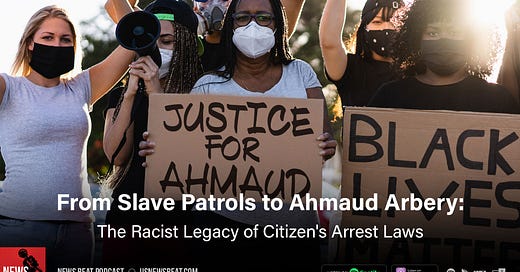From Slave Patrols to Ahmaud Arbery
We examine the racist legacy of America's citizen's arrest laws, yet another legal relic of the Civil War era.
News Beat is a multi-award-winning podcast that melds hard-hitting journalism with hip-hop to inform, educate, and inspire. This episode examines the racist history of citizen’s arrest laws—including the now-repealed Georgia citizen’s arrest law used to justify the 2020 slaying of Ahmaud Arbery.
By now, many of you are likely familiar with the circumstances around the slaying of Ahmaud Arbery last year: The 25-year-old was jogging in a south Georgia neighborhood when he was chased and gunned down. The father-and-son duo now on trial for Arbery’s death, Gregory and Travis McMichael, suspected Arbery was responsible for a spate of purported burglaries in the area that winter. Their neighbor William “Roddie” Bryan, who joined the chase and recorded Arbery’s killing, is also on trial. After Arbery’s fatal encounter, surveillance footage revealed multiple people, including children, strolling through the same a residential construction site he’d visited.
Arbery’s death was the first in a string of slayings last year that ignited historic racial injustice protests across the country. George Floyd and Breonna Taylor were killed by police, and Arbery was pursued and fatally shot by civilians claiming to be making a citizen’s arrest. Under Georgia’s now-repealed Civil War-era citizen’s arrest law—action spurred by Arbery’s death—a private citizen was legally allowed to arrest someone committing a crime in their presence or “within his immediately knowledge.”
Why We Covered This Topic
As producers of a social justice podcast, we try to understand how the past impacts the present—and in this case, how a Civil War-era law (its repeal notwithstanding) is being used to justify the slaying of a Black man jogging in a residential neighborhood in 2020.
We’ve previously covered the consequences of racist, archaic laws still on the books, namely felony disenfranchisement, which strips people of their right to vote following a felony conviction, impacting millions. Modern-day citizen’s arrest laws and felony disenfranchisement are just two elements of a sweeping system designed to oppress Black populations.
In another high-profile citizen’s arrest case out of Georgia, 21-year-old Hannah Payne followed a 62-year-old man after witnessing him hit another vehicle—and allegedly shot and killed him.
This summer, Georgia’s legislature repealed its law, which Republican Governor Brian Kemp characterized as “a Civil War-era law, ripe for abuse.”
Yet, even that hasn’t prevented the McMichaels from using it as a defense.
What You’ll Learn in This Episode
Citizen’s arrest laws originated in the 13th century and were brought here by British colonists.
During slavery, citizen’s arrests melded with newly formed slave patrols to prevent escaped slaves from achieving freedom.
Georgia passed its citizen’s arrest law in 1863 following the breakdown of the slave patrol system as citizens joined the Confederate Army.
Citizen’s arrests laws exist in every state in the United States.
Who We Interviewed & What They Said
Dr. Alan Singer, a professor of teaching, learning and technology at Hofstra University in New York
“I'm looking at citizen’s arrest today, I'm looking at a white vigilantism today, I'm also looking at a lot of police behavior today, as an extension of what took place in the prior era by groups like the KKK. I think the Black Lives Matter movement has really drawn attention to this, to people who were cut down and who should not have been, who should still be with us. People like George Floyd, Eric Garner, Trayvon Martin, Breonna Taylor, and Ahmaud Aubrey. It's frightening to the extent that Black lives have not mattered in the United States.”
Additional Resources
Here’s a comprehensive research paper on citizen’s arrest laws produced by American University.
“Ahmaud Arbery suspects' trial defense taps a racist legal legacy” by Alan Singer
“In Ahmaud Arbery's Name, Georgia Repeals Citizen's Arrest Law”
Join the News Beat Podcast Family!
Subscribe to our Substack to ensure you receive updates about episodes, relevant stories, and more.
You can listen to News Beat on your favorite podcast app. The button below will enable you to subscribe wherever you listen to pods.
Please share our Substack to help build this community and support independent media.
News Beat is a multi-award-winning podcast brought to you by Morey Creative Studios and Manny Faces Media.
Audio Editor/Sound Designer/Producer/Host: Manny Faces
Editor-In-Chief/Producer: Chris Twarowski
Managing Editor/Producer: Rashed Mian
Episode Art: Jeff Main
Executive Producer: Jed Morey



